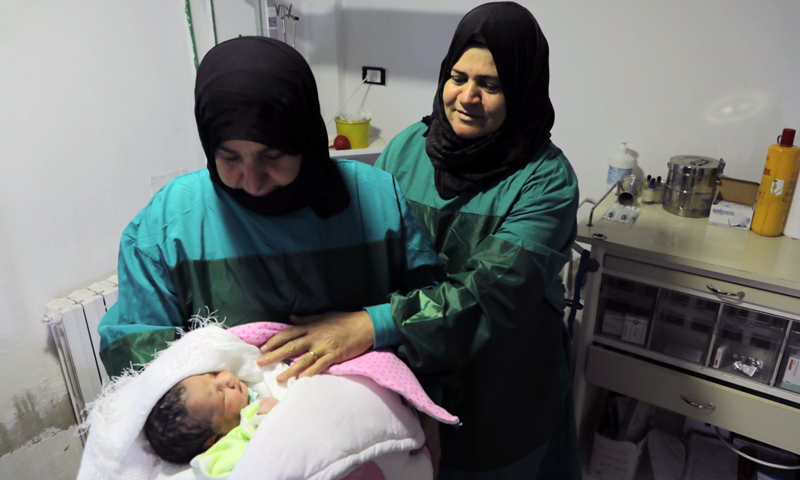Idlib – Youssef Gharibi
Walid Aslan’s child got a fever spike in the middle of the night suddenly. Therefore, Aslan rushed to take his child to one of the hospitals in the town of Ariha, southern Idlib, where he was staying. However, he could not find any medical center or hospital receiving patients at this time. He was, then, forced to bring him to the city of Idlib.
What happened with Aslan during his search for a medical center at night summarizes the suffering of thousands of Ariha’s residents after the deterioration of health status in the area, as a result of the failure of hospitals to open their doors to patients 24 hours a day.
In the town of Ariha, there are hospitals and medical points belonging to the Idlib health directorate and organizations, but they operate in an administrative system, with no night shifts.
Ariha has not recovered yet
The military campaigns launched by the Syrian regime on opposition-held areas, especially from August 2019 until the signing of the Russian-Turkish agreement on 5 March, affected the health sector negatively in the town, as a result of targeting hospitals, medical centers, and vital facilities. Plus, the bombing led to the displacement of the city’s population for more than four months.
In an interview with Enab Baladi, Muhammad Hallaj, the director of Syria’s Response Coordination Group (SRCG), explained that several demands and warnings were directed to the concerned organizations, but the response is still weak. Hallaj stressed that the medical situation in Ariha and Jabal al-Zawiya, south of Idlib, is “very bad.”
According to Hallaj, the population of Ariha is currently about 83,000 after many Internally Displaced People (IDPs) returned to their homes. The volunteers in the center of the Syrian Civil Defence (SCD) in Ariha transfer about ten sick cases every day from Ariha to the city of Idlib in addition to the transfer of patients from other centers. Most of the cases result from accidents and fractures requiring immediate surgery, imaging, or casting, and these health services are not available in Ariha, the director of the SCD center, Mohammad al-Hashem told Enab Baladi.
The injuries and pathological cases are transported to the nearest medical point in the city of Idlib, which is a long-distance away. If the sick condition is severe, the patient may die on the way, according to Hallaj.
As for the COVID-19 isolation centers in the region, they are not designated or prepared to handle health emergencies. They have not received any emergency cases.
Modest return to medical work
Medical centers in Ariha are no longer active as before. However, there are three clinics, a children’s and women’s hospital, and a physical therapy center; in addition to that, work is underway to support them with a general surgery hospital, Dr. Anas Daghim, the primary health care officer at the Idlib Health Directorate, told Enab Baladi.
Following the recent wave of displacement from Ariha at the beginning of this year, and after Ariha Surgical Hospital was bombed, the humanitarian organizations, hospitals, and medical points stopped their work and activities and moved outside the city. Still, some medical centers have resumed their work recently, the head of the Ariha Local Council, Omar Salouh, told Enab Baladi.
In Ariha, UOSSM opened a primary care center consisting of sections for children, gynecology, general and internal medicine, as well as a nutrition clinic, a team of community health workers, and labor and delivery nurses who provide reproductive health services and a free pharmacy that offers the vaccine service, the project coordinator at UOSSM, Majd Fahham, told Enab Baladi.
Last July, the medical centers of UOSSM in Ariha received 141 births, 446 medical consultations in the labor department, and 3,500 responses from the health care center, in addition to providing all kinds of analyzes, Fahham indicated.
He pointed out that there is a shortage of medical specialists, which forces organizations to hire a “general practitioner.”
For example, in the medical center of Ariha, there is an absence of a female gynecologist, which forced the organization to employ a “general physician, after protocols related to reproductive health and gynecology.”
The “Sima” organization also opened a hospital that specializes in women and children, and there is a health isolation center for people infected with coronavirus, but its work is limited to the administrative working hours, according to the head of the local council, Omar Salouh.
The area lacks a surgical and emergency hospital throughout the day, and the local council is trying, according to Salouh, to work and communicate with organizations and volunteers to restore the surgical hospital and equip an emergency point with volunteer cadres.

